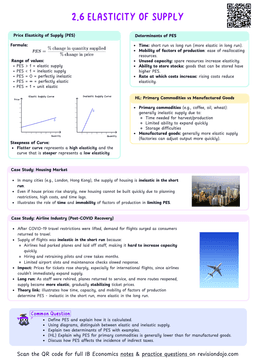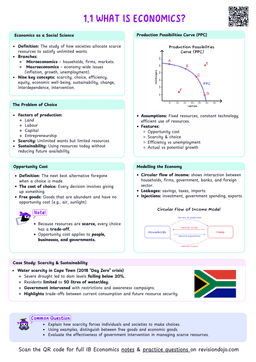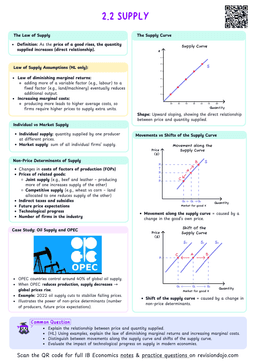Economic well-being
The level of prosperity, economic satisfaction, and standard of living experienced by members of an economy.
- Standard national income statistics (GDP/GNI) do not provide meaningful measures of the economic well-being of the residents of an economy.
- There are other specific alternative measures of well-being:
- OECD Better Life Index.
- Happiness Index.
- Happy Planet Index.
- These indices consider a broader range of dimensions beyond economic activity, providing a more comprehensive view of well-being.
OECD Better Life Index
OECD Better Life Index
An alternative to traditional national income statistics that evaluates economic well-being across multiple dimensions, incorporating aspects that account for the quality of life.
- The OECD Better Life Index was developed by the Organisation for Economic Co-operation and Development (OECD) to measure well-being.
- The index evaluates well-being using 11 dimensions, divided into two categories:
- Material conditions:
- Income.
- Jobs.
- Housing.
- Quality of life:
- Health.
- Education.
- Work-life balance.
- Social connections.
- Civic engagement.
- Environmental quality.
- Personal security.
- Subjective well-being.
- Material conditions:
Indices, such as the OECD Better Life Index, measures values in a range between two values. These values are usually 0 to 1, but in the case of the OECD BLI, it is from 0 to 10.
ExampleThe OECD provides the index values for each of the 11 dimensions it evaluates. So for example, for housing, here are some real-world values (more is better):
- Spain: 6.7
- Poland: 5.1
- Norway: 8.1
The OECD Better Life Index is a meaningful measure since it:
- Goes beyond economic performance to include social and environmental factors that contribute to well-being.
- Provides policymakers and the public with a more nuanced understanding of societal progress.
- Encourages the formulation of policies aimed at improving overall quality of life.
Happiness Index
Happiness Index
An alternative to traditional national income statistics that measures economic well-being using numerous quality of life dimensions in addition to real GDP per capita.
- The Happiness Index of countries has been compiled by the United Nations Sustainable Development Network since 2012, and it is published annually in the World Happiness Report.
- The index measures happiness based on six key dimensions:
- Real GDP per capita.
- Social support.
- Healthy life expectancy.
- Freedom to make life choices.
- Generosity.
- Perceptions of corruption.
The Happiness Index is measured on a scale from 0 to 10, where higher scores indicate greater levels of happiness.
ExampleFor reference, here are the Happiness Index values for some countries:
- Finland: 7.741
- Montenegro: 5.707
- Afghanistan: 1.721
The Happiness Index is a meaningful measure since it:
- Focuses on happiness as a fundamental measure of societal success.
- Highlights the importance of social and environmental factors in well-being.
- Provides insights into the relationship between policy and happiness (e.g., themes like migration and happiness, community foundations of well-being).
- Provides policymakers and the public with a more nuanced understanding of societal progress.
- Encourages the formulation of policies aimed at improving overall quality of life.
Happy Planet Index
Happy Planet Index
An alternative to traditional national income statistics that accounts for environmental sustainability and inequalities as a measure of economic well-being.
- The Happy Planet Index was introduced by the New Economics Foundation (NEF) in 2006 as a measure of sustainable well-being.
- The index combines three main factors:
- Life expectancy: based on United Nations data.
- Well-being: measured through surveys on life satisfaction.
- Ecological footprint: evaluates the environmental impact of individuals and societies.
The Happy Planet Index is measured on a scale from 0 to 100, where higher scores indicate better performance.
ExampleFor reference, here are the Happy Planet Index scores for some countries:
- Vanuatu: 57.9
- Portugal: 51.0
- Chad: 18.3
The Happy Planet Index is a meaningful measure since it:
- Encourages sustainable development by highlighting the relationship between well-being and environmental sustainability.
- Promotes the idea that economic growth should not come at the expense of the environment or social equity.
While alternative measures for economic well-being provide advantages against traditional national accounting statistics, they also have certain disadvantages, such as:
- Difficulties in measuring some dimensions, such as equity.
- Potential subjectivity in comparisons across countries.
- The subjective nature of happiness makes it difficult to quantify consistently across cultures.
- Variations in how happiness is understood globally.
- The concept of ecological footprint remains debated among experts.


